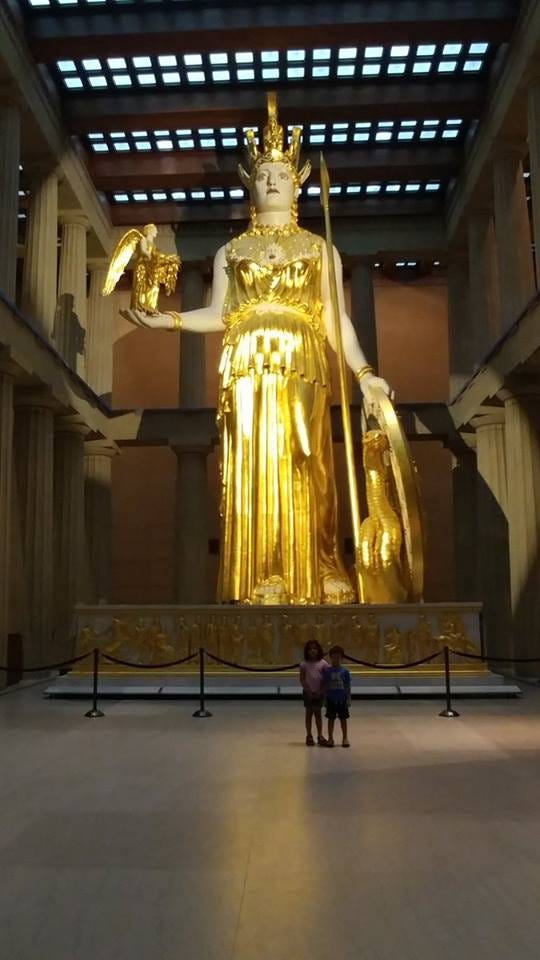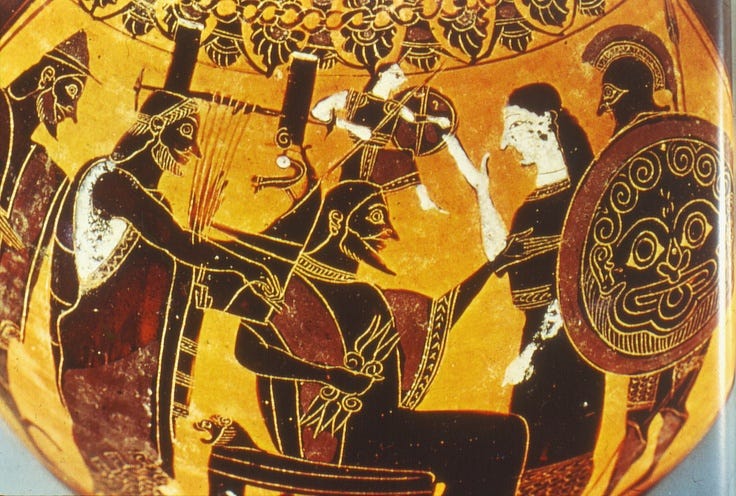Reminder: all proceeds from the substack are donated to classics adjacent non-profits on a monthly basis.
Athena in Epic
Athena is one of the most important divinities in Homeric epic, perhaps not reflecting her ritual roles in Greece (outside of Athens). Her primary role in myth, after her birth, is as her father’s right-hand among mortals. She has a special role in aiding and assisting heroes. In myth, she was at times alongside heroes like Herakles. In the Iliad, she is one of the goddesses who is opposed to Troy but specifically acts as a special sponsor of heroes like Diomedes in book 5.
This post is a collection of resources about Athena to help understand her position in Greek epic a little more.
Homeric Hymn to Athena 1 (Allen 11)
The shorter of the extant Homeric hymns focuses on Athena's connection with war and heroes
“I begin to sing of Pallas Athena the dread
defender of cities, to whom the acts of war are a concern with Ares:
the cities sacked, the shrill sound, and the battles,
She rescues the host when it leaves and when it returns”Παλλάδ' ᾿Αθηναίην ἐρυσίπτολιν ἄρχομ' ἀείδειν
δεινήν, ᾗ σὺν ῎Αρηϊ μέλει πολεμήϊα ἔργα
περθόμεναί τε πόληες ἀϋτή τε πτόλεμοί τε,
καί τ' ἐρρύσατο λαὸν ἰόντα τε νισόμενόν τε.
Χαῖρε θεά, δὸς δ' ἄμμι τύχην εὐδαιμονίην τε.
Homeric Hymn to Athena, 2 (Allen, 28)
The longer of the extant Homeric Hymns to Athena tells the story of her birth (but not her conception) perhaps reflecting the war-dances done in her honor
"I begin to sing the honored goddess, Pallas Athena,
The grey-eyed, very-clever one with a relentless heart,
A city-defending, revered and courageous maiden
Tritogeneia, whom counselor Zeus himself gave birth to
from his sacred head, already holding her weapons,
all gold and shining. Then awe took all the immortals
who looked on. And she rose from the immortal head
of aegis-bearing Zeus immediately in front of them
shaking her sharp spear. And great Olympos shook
terribly beneath the fury of the grey-eyed goddess
as the ground echoed frightfully around. Even the sea
was churned up with its dark waves and the brine seized
suddenly. The glorious son of Hyperion brought his
swift-footed steeds to rest for a long time until
the maiden Pallas Athena took the divine weapons
from her immortal shoulders. And counselor Zeus laughed.
Hail to you, then, child of aegis-bearing Zeus.
And I will also praise you with yet another song still."Παλλάδ' ᾿Αθηναίην κυδρὴν θεὸν ἄρχομ' ἀείδειν
γλαυκῶπιν πολύμητιν ἀμείλιχον ἦτορ ἔχουσαν
παρθένον αἰδοίην ἐρυσίπτολιν ἀλκήεσσαν
Τριτογενῆ, τὴν αὐτὸς ἐγείνατο μητίετα Ζεὺς
σεμνῆς ἐκ κεφαλῆς, πολεμήϊα τεύχε' ἔχουσαν
χρύσεα παμφανόωντα• σέβας δ' ἔχε πάντας ὁρῶντας
ἀθανάτους• ἡ δὲ πρόσθεν Διὸς αἰγιόχοιο
ἐσσυμένως ὤρουσεν ἀπ' ἀθανάτοιο καρήνου
σείσασ' ὀξὺν ἄκοντα• μέγας δ' ἐλελίζετ' ῎Ολυμπος
δεινὸν ὑπὸ βρίμης γλαυκώπιδος, ἀμφὶ δὲ γαῖα
σμερδαλέον ἰάχησεν, ἐκινήθη δ' ἄρα πόντος
κύμασι πορφυρέοισι κυκώμενος, ἔσχετο δ' ἅλμη
ἐξαπίνης• στῆσεν δ' ῾Υπερίονος ἀγλαὸς υἱὸς
ἵππους ὠκύποδας δηρὸν χρόνον εἰσότε κούρη
εἵλετ' ἀπ' ἀθανάτων ὤμων θεοείκελα τεύχη
Παλλὰς ᾿Αθηναίη• γήθησε δὲ μητίετα Ζεύς.
Καὶ σὺ μὲν οὕτω χαῖρε Διὸς τέκος αἰγιόχοιο•
αὐτὰρ ἐγὼ καὶ σεῖο καὶ ἄλλης μνήσομ' ἀοιδῆς.
Birth of Athena
As Lenny Muellner talks about in his analysis of the structure of Hesiod’s Theogony, Athena is born in part of Zeus’ attempt to resolve various tensions in the creation of the Universe including gender binaries, intelligence/strength, and age/youth. By giving birth on his own after consuming his first ‘wife’ Metis, he resolves these conflicts and gives birth to a somewhat androgynous daughter who is, in a way, a mirror of himself.
The following fragment of Hesiod (343 MW) is preserved by Galen and appears to come out of a tradition presenting a catalog of Zeus' wives. In this is overlaps in content with Hesiod's Theogony (806-901 and following) which has a similar order. Some of the details, however, are a bit different. Of special notice is the description of Metis' hanging out in Zeus' entrails or the creation of the Aegis.
Galenus, De placitis Hippocr. et Plat. iii. 8 p. 318 Müller
(=Chrysippus fr. 908, Stoic. Vet. Fr. 11. 256 v. Arnim)
“Because of that rivalry, [Hera] bore a famous son,
Hephaistos, on her own without aegis-bearing Zeus,
A son who surpassed all of the gods with his hands.
But [Zeus] stretched out next to the daughter of
Ocean and well-tressed Tethys apart from fair-cheeked Hera,
As he surprised Metis, even though she knows much.
He grabbed her with his hands and put her in his belly,
Because he feared that she might bear something stronger than lightning.
This is the reason that Kronos’ royal son who lives in the sky
Suddenly swallowed her whole. She was immediately pregnant
With Pallas Athena, whom the father of men and gods produced
Through his head near the banks of the river Tritôn.
Mêtis sat hidden beneath Zeus’ entrails,
That mother of Athena, creator of just affairs,
The one who knows most of gods and mortal men.
Then the goddess Themis stretched out beside him,
She surpassed all gods who have Olympian homes with her skilled handsl
She made the aegis, that army-routing armor of Athena,
Alongside the one who bore her, Athena dressed in warrior’s arms.”ἐκ ταύτης ἔριδος ἣ μὲν τέκε φαίδιμον υἱὸν
῞Ηφαιστον †τέχνηισιν ἄνευ Διὸς αἰγιόχοιο
ἐκ πάντων παλάμηισι κεκασμένον Οὐρανιώνων·
αὐτὰρ ὅ γ' ᾿Ωκεανοῦ καὶ Τηθύος ἠυκόμοιο
κούρηι νόσφ' ῞Ηρης παρελέξατο καλλιπαρήου
ἐξαπαφὼν Μῆτιν καίπερ πολύιδριν ἐοῦσαν·
συμμάρψας δ' ὅ γε χερσὶν ἑὴν ἐγκάτθετο νηδύν,
δείσας μὴ τέξηι κρατερώτερον ἄλλο κεραυνοῦ·
τούνεκά μιν Κρονίδης ὑψίζυγος αἰθέρι ναίων
κάππιεν ἐξαπίνης. ἣ δ' αὐτίκα Παλλάδ' ᾿Αθήνην
κύσατο· τὴν μὲν ἔτικτε πατὴρ ἀνδρῶν τε θεῶν τε
πὰρ κορυφήν, Τρίτωνος ἐπ' ὄχθηισιν ποταμοῖο.
Μῆτις δ' αὖτε Ζηνὸς ὑπὸ σπλάγχνοις λελαθυῖα
ἧστο, ᾿Αθηναίης μήτηρ, τέκταινα δικαίων,
πλεῖστα θεῶν εἰδυῖα καταθνητῶν τ' ἀνθρώπων.
†ἔνθα θεὰ παρέλεκτο Θέμις† παλάμαις περὶ πάντων
ἀθανάτων ἐκέκασθ' οἳ ᾿Ολύμπια δώματ' ἔχουσιν,
αἰγίδα ποιήσασα φοβέστρατον ἔντος ᾿Αθήνης·
σὺν τῆι ἐγείνατό μιν, πολεμήϊα τεύχε' ἔχουσαν.
Solon, fr. 4.4-5 (6th Century BCE)
Solon emphasizes Athena's power as a protector and connection with Zeus
“This sort of a great-hearted overseer, a daughter of a strong-father
Holds her hands above our city, Pallas Athena”τοίη γὰρ μεγάθυμος ἐπίσκοπος ὀβριμοπάτρη
Παλλὰς ᾿Αθηναίη χεῖρας ὕπερθεν ἔχει•
Euripides, Heracleidae 770-72 (5th Century BCE)
Euripides echoes Solon but also refers to Athena as a maternal figure
“Queen, the foundation of the land
and the city is yours, you are its mother,
mistress and guardian..”ἀλλ', ὦ πότνια, σὸν γὰρ οὖ-
δας γᾶς καὶ πόλις, ἆς σὺ μά-
τηρ δέσποινά τε καὶ φύλαξ...
Aristophanes, Knights 581-585 (5th Century BCE)
Aristophanes echoes the defender motif and connects it with the glory of Athens as a martial and creative center (perhaps under influence of a more robust Panathenaia)
“O Pallas, protector of the city,
The most sacred city-
and defender of a land
that surpasses all others
in war and poetry.”῏Ω πολιοῦχε Παλλάς, ὦ
τῆς ἱερωτάτης ἁπα-
σῶν πολέμῳ τε καὶ ποη-
ταῖς δυνάμει θ' ὑπερφερού-
σης μεδέουσα χώρας,
Here, for your pleasure, a symptom of a particular kind of madness. The wide range of epithets, cult-names and geographical associations for Athena presents us with a rather different idea of the goddess from what we get in conventional summaries.
Athena Ageleiê (“bringer of Spoils”), epithet
Athena Aglauros (“Shining, Bright, Noble”) epithet, Athens (also a daughter of Cecrops)
Athena Agoraia (“The Assembly Goddess”) cult-name, Sparta
Athena Aithuia (“The Diver”; “Sea-Gull”) cult-name, Megara
Athena Alea (“warmth”), cult-name, Arcadia (Tegea)
Athena Akria (“On High”) cult-name, various
Athena Alalkomenêis: (“defender”), epithet and cult-name, Boeotia
Athena Amaria (“Bright Sky”), cult-name in Achaea
Athena Amboulia: (“Without Council”) cult-name, Sparta
Athena Anemôtis (“Windy”?), cult-name, Messenia
Athena Arkhêgetis (“Founder”) cult-name, Athens
Athena Atrutônê (“Tireless”), epithet
Athena Boarmia (the “yoker of Oxen”; worshipped in Athens)
Athena Eilenia/Ellênia (Uncertain, “Warmth”; “Light”), cult-name, Metapontum
Athena Erganê: (“Craftswoman”) cult-name, Athens
Athena Ergatis (“Craftsman”) cult-name, Samos
Athena Glaukôpis (“bright-eyed”; “grey-eyed”; “owl-eyed”), epithet
Athena Gorgonophonos (“Gorgon-slayer”) epithet, Euripides Ion 987
Athena Hygeia (“Health”; “Cleansing”)
Athena Hellôtis (unclear, “Capture” or named for a maiden) Cult-name, Corinth and Marathon
Athena Hephaistia, cult-name, Athens
Athena Hippia (“Horsewoman”), Cult-name, Corinth (perhaps associated with the yoking of Pegasos)
Athena Homolôis (“The Constant”; “Concord”) cult-name, Boeotia
Athena Itonia (Toponym) cult-name, Boeotia
Athena Keleutheia (“Of the Roads”) cult-name, Sparta
Athena Kalliergos (“Fine-worker”), cult-name, Epidauros
Athena Ktêsia: (“Founding Goddess”) cult-name, various
Athena Korêsia (Toponym, near lake Korêsia?), cult-name
Athena Kranaia (“On the Top of the Hill”) cult-name, Elatea
Athena Khalinîtis (“The Bridle-Goddess”), cult-name, Corinth (associated with the yoking of Pegasos)
Athena Kissaia (“Ivy”) cult-name, Epidauros
Athena Mêter (“Mother”) Athens, Crete
Athena Mêkhanîtis (“Diviser”) cult-name, Megalopolis
Athena Narkaia (dubious: “Cold”; “Lightning”; “The goddess who petrifies”), cult-name in Elis
Athena Nedousia (Toponym, “near the river Nedôn”) cult-name, Laconia
Athena Nikê: (“Victory”) cult-name, Athens
Athena Oksuderkês (“keen-eyed”) cult-name, Argos
Athena Ophthalmîtis (“Sharp-eyed”) cult-name, Sparta
Athena Onga, Ogkaiê (Unclear: “Bellowing”; “Stately”, of oxen) cult-name, Thebes
Athena Pandrosos (“All-doer”) epithet, Athens (also a daughter of Cecrops)
Athena Parthenos (“The Virgin”), cult-name, Athens
Athena Phratria/Apatouria (“Tribal God”) cult-name, Ionian states, Athens, Cos
Athena Polias (“Guardian of the City”), cult-name, Athens
Athena Promakhos (“The Fore-fighter”) cult-name, Troezen, Athens
Athena Pronoias (“Fore-thought”) cult-name, Delphi
Athena Skiras (Toponym, old name at Salamis; also “Sun-Shade”) cult-name, Athens, Salamis
Athena Salpingks (“Trumpeter”) cult-name, Argos
Athena Stoikheia (“Marshaller of Ranks”)
Athena Tritogeneia (Homer, other poetry, rarely in ritual): false-etymology: “head-born”; more likely: “water-born”; perhaps a toponym (e.g. Triton a river; cf. Cyprogenes)
Athena Tritônia (Toponym, “Near the River Tritonis) cult-name
Athena Zôstêria (“Girder”) cult-name, Thebes and Athens
Sources:
OCD3
Walter Burkert. Greek Religion. Cambridge, 1985.
Clay, J. S. 1983. The Wrath of Athena: Gods and Men in the Odyssey. Princeton.
———. 1989. The Politics of Olympus: Form and Meaning in the Major Homeric Hymns. Princeton.
L. R. Farnell. The Cults of the Greek City States. 1895.
Herington, C. J. “Athena in Athenian Literature and Cult.” Greece & Rome 10 (1963): 61–73. http://www.jstor.org/stable/826896.
Pope, M. W. M. “Athena’s Development in Homeric Epic.” The American Journal of Philology 81, no. 2 (1960): 113–35. https://doi.org/10.2307/292327.
Timothy Gantz. Early Greek Myth. Baltimore, 1993.
Simon Price. Religions of the Ancient Greeks. Cambridge, 1999.
Preparatory Posts
Five Major Themes to Follow in the Iliad
Book-by-book posts
The Plan: Zeus’ Plan in the Iliad
Prophet of Evils: Reading Iphigenia in and out of the Iliad
Speaking of Centaurs: Paradigmatic Problems in book 1
Thersites’ Body: Description, Characterization, and Physiognomy in book 2
Heroic Appearances: What Did Helen Look Like?
Sources for Helen in Early Greek Poetry



